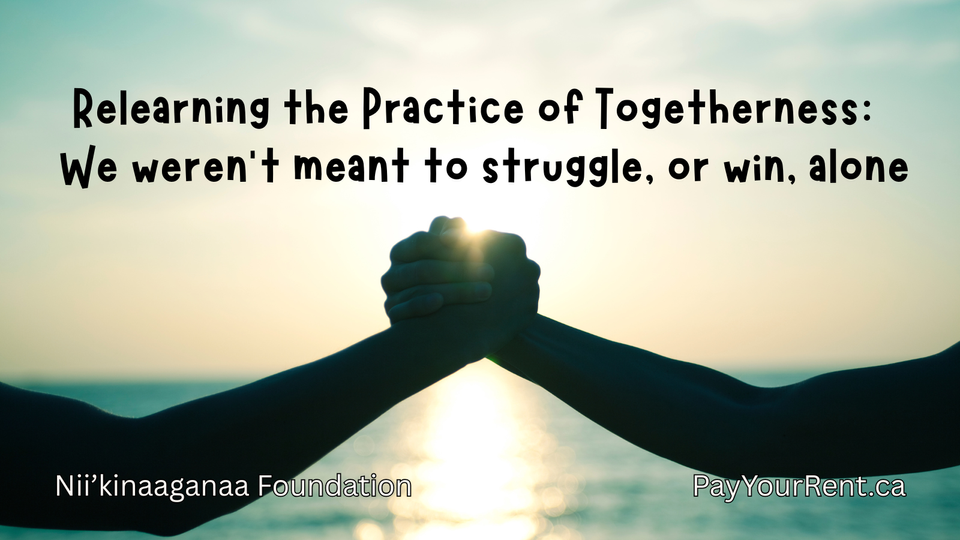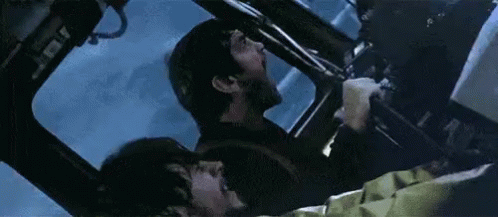Relearning the Practice of Togetherness

Forwarding this email, or posting it on social media along with some words about why you support us helps to expand our reach!

Hot take: doom-scrolling isn’t all bad. In fact, we should be proud of our doom-scrolling (up to a point)! Why? Because however preoccupied we are with a sense of dread, however much time we lose, frozen in the headlights of horror story after horror story, it ultimately means we’re human and we care about other humans and the general state of the world. Unfortunately for us doomies, the existence of this care alone won’t disrupt predatory systems, lift up our marginalized neighbours, build life-saving community infrastructure, or improve the material realities of the oppressed. These acts of mutual aid and solidarity can only be accomplished by dovetailing care into practice and doing so together—which has been no small task these last few years, thanks in part to the global pandemic.
The word “doom-scrolling” entered the lexicon at the height of Covid-19—a universally traumatic event that forced everyone apart. And with trauma often comes a loss of agency: that empowering life force that reminds us we can indeed make a difference. Now add in the ability to scroll the news at any time, multiply everything by five lonely years, and you’ve got all the makings of a perfect storm (with none of the George Clooney).

Reflecting on how Covid (and the disaster capitalism that followed in its wake) stymied and quarantined us from our shared humanity, author, organizer, and educator Kelly Hayes laments that:
Early in the pandemic, many of us experienced profound losses in a more isolated way. Our habits and coping skills [cough cough doom-scrolling] became more insular. In some ways, we unlearned the practice of togetherness. Many of us became more socially avoidant and more accustomed to being alone, even if we were lonely.
It’s this kind of isolation that makes the heavy stuff feel especially heavy. Without the infrastructure of meaningful, supportive, and replenishing connections in our lives, we start to feel crushed under the weight of right now (read: our continued descent into fascism) and the terrifying question mark that is the future. The more isolated we are, the more we feel like there’s nothing we can do about any of it.
It’s exactly how our oppressors want us to feel—need us to feel. They understand that people who believe their actions are futile are less likely to get together to organize, disrupt, and practice solidarity. They understand that our isolation leads to scrolling leads to despair leads to detachment leads to individualism and back to isolation. For our part, WE must understand this vicious cycle is how systems of oppression survive and thrive—the system isn’t broken; it’s functioning exactly how it’s supposed to. Weighing in on the psychological and emotional effects that our often “confining” digital infrastructure has on our struggle to navigate the current moment, Hayes writes:
On social media, headlines, takes, and reactions simply happen. We react with clicks and takes, or simply continue to endure this happening of things. The experience is relentless and marked by a sense of inevitability. There is always more to consume. There is always pain. We return to the pain, knowing it's there, and not knowing how to do something else instead, however depressed or unsatisfied we may feel.
In our last newsletter, we talked about what it means to be an antibody against the unsustainable extraction that capitalism relies on and the extinguishment of Indigenous people that colonialism pursues. And as we continue to consume news about the abductions of students who speak out against Israel’s genocide of the Palestinians, dehumanizing migrant injustices, the right’s war on trans rights, the government-led decommissioning of safe consumption sites, the continued attempts to criminalize houselessness, and the likely election of a Prime Minister who seems to have no meaningful plan for Indigenous reconciliation, we need more antibodies than ever. We especially can’t rely on those doing the work right now because they’re burning out faster and faster and desperately need you and I to step in/up so they can rest and recharge (and they’ll do the same when we need to rest—that’s the power and promise of solidarity).
Whether it’s volunteering at a wellness centre or providing meals to those experiencing food insecurity (see: two of the organizations we support, below), joining together to resist and organize against the bloodthirsty systems that prioritize profits over people and the planet is the only way we can realize our true power: people power. These systems understand the source of this power and it’s why they’ll do whatever they can to keep us apart (including, but not limited to, designing digital infrastructure to instill, exacerbate, and prey on our dopamine-seeking patterns). But the more we are, the more we can do.
And if you’re still feeling beat down (who isn’t right now?), I find it helpful to remember that doom is just a mood, in that, like any other mood, it will pass—UNLESS, of course, we allow the systems and technocrats profiting off our dread and isolation to continue doing so. The best thing we can do for ourselves and others is to relearn the practice of togetherness because togetherness is the antibody of doom (how often do you doom-scroll when you’re with friends and community??) and togetherness is how we stay alive and win. Hayes writes “When so many people are isolated, community-affirming events are vital.” Whether it’s educating yourself, starting or joining a book club, participating in a community garden, or attending a protest (a great way to break through the sense of isolation and an excellent reminder that there are other people out there fighting for justice and change), “the most important move a frozen person can make is whatever breaks the cycle.”
To sum it all up, engaging with our neighbours helps us navigate our doom, restore our agency, and build the inclusive infrastructure that will help us weather the rising tide of fascism and establish value systems that aren’t rooted in oppression, but honour our shared humanity and lay the foundation for the just world we deserve to live in. And as we relearn the practice of togetherness, let us also practice self-compassion and remember that socializing (in any capacity or context) is a muscle—one that has likely atrophied over the pandemic, but one that will get stronger the more it’s engaged.
Now let’s meet two organizations we support and hear what they have to say on the role that community plays in their work.
Resilience Montreal was founded in 2019 by the Native Women’s Shelter of Montreal in response to the urgent need for a safe space for unhoused Indigenous people near Cabot Square. After seeing the gaps in services for those dealing with houselessness, addiction, and trauma, the shelter created a low-barrier space where people could access food, hygiene, and support services. By 2021, it became an independent registered charity and expanded its offerings while still advocating for long-term solutions that address the root causes of systemic inequities.
When it comes to material and survival needs, Resilience Montreal provides hundreds of meals, access to laundry and showers, and a place for people to rest, every day. It also runs cohabitation events to strengthen relationships between housed and unhoused community members, and offers employment opportunities through its Clean Team, where clients can earn an income by helping keep the neighborhood clean. Currently, Resilience Montreal is working to establish an Indigenous wellness centre—a space designed to provide cultural healing, housing, and long-term support for its community. Reflecting on a special moment Nii’kinaaganaa was able to help facilitate (thanks to your support!), Executive Assistant, Selena Martineau, said:
One of the most heartwarming moments happens when we serve country food. As soon as the smell of beluga or caribou fills the air, you can feel a shift—people start gathering, smiling, and sharing stories. There’s a sense of home, even for those who have been far from theirs for years. Seeing the joy and connection that a simple meal can bring reminds us why we do this work. It’s not just about food—it’s about healing, identity, and belonging.
And on the role community plays in Resilience Montreal’s work, she said:
This work isn’t possible without the collective effort of staff, volunteers, donors, and the people we serve. When things get overwhelming—and they often do—community is what recharges us. Seeing people uplift one another, witnessing moments of resilience, and knowing that we are not alone in this fight keeps us going.
Now over to Kids Eat First—a grassroots initiative based out of Oneida Nation of the Thames that provides groceries and care items for community members with kids. Led by Luke Nicholas (Turtle Clan), Kids Eat First was born in the early days of the pandemic when schools that were providing up to three meals a day started closing. When he heard that Indigenous children who relied on that support were going hungry, Luke tapped into his extensive social network and sent out the first “Kids Eat First Alert.” He simply described a family’s situation and asked for help—and the community answered with food donations, grocery cards, funds, and delivery assistance.
Whether through policy, advocacy, or simply showing up for those in need, Luke has committed his life to community development: he’s served three terms on the Oneida Council, lobbied for numerous Indigenous organizations, and been President of the N'Amerind Friendship Centre in London and Treasurer of Atlohsa Healing Lodge in Edmonton. To this day he still finds himself in awe of the compassion people are capable of:
Kids Eat First has been supporting a grandmother raising her six grandchildren after both parents passed away due to overdose. She was determined to keep the siblings together and out of the foster care system. We’ve provided groceries and essentials for the family, but also much more. Volunteers have stepped in to help clean, do laundry, and even babysit to give the grandmother a break. It’s a small village of support that has helped keep that family together—and reminded us all of the power of community.
With the help of your funds, Nii’kinaaganaa has been able to help Luke feed over 450 children since Kids Eat First began. These kinds of community actions and initiatives strengthen our shared humanity by bringing people together and reminding us that we have the capacity to care for one another. For Luke, this is where hope comes from. He writes:
For families under immense pressure—economic hardship, poor health, social isolation—a small act like delivering a bag of groceries can mean the world. It means a child won’t go to school hungry. It means they’ll go to bed with a full stomach. It means they get a small piece of dignity in a world that often forgets them. But more than that, it teaches something deeper—that people care and that hope is still alive. That’s why this work matters. That’s why we must keep going.
For those who made it this far: 1) way to go and 2) in the spirit of community and relearning the practice of togetherness, I encourage/dare you to share this newsletter with at least one friend and talk about it after (or better yet: read it together!). Bonus points for conversations that inspire an action of solidarity or community-building!
Thanks for reading and supporting,
The Nii’kinaaganaa Team
“Our regard for one another makes us stronger. It allows us to resist and survive together.”
-Kelly Hayes, “Let’s Be Politically Promiscuous”